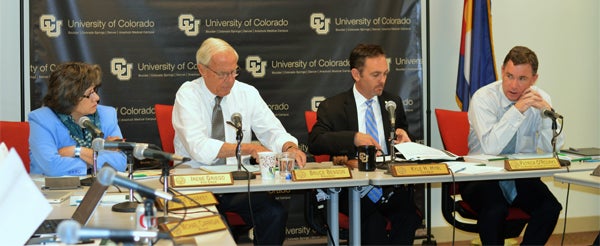Regents OK modest increases to tuition, compensation

The CU Board of Regents on Monday voted to approve a slate of modest tuition increases at campuses for the next fiscal year. They are among the lowest rate increases proposed in nearly a decade, and well below the 6 percent maximum increases currently allowed by the Legislature.
During the meeting at 1800 Grant St., the board also approved salary increases of varying percentage amounts for faculty, classified staff, university staff and officers.
Tuition will rise only 2.9 percent at CU-Boulder for typical resident undergraduates, 3.5 percent at CU Colorado Springs and about 1.6 percent at CU Denver. The last figure is a blended amount that takes into account the many varying tuition rates at the campus.
Full-time students also will pay slightly higher fees next year, as the board approved increases at CU-Boulder ($38), UCCS ($15) and CU Denver ($42).
Compensation rates as recommended by administration passed with a unanimous nine-member vote, while the separate tuition and fee votes passed 8-1, with Regent John Carson, R-Highlands Ranch, opposing both.
“As someone who just ran in the last election, I’m pretty sensitive to this,” Carson said. “That’s pretty much what anyone wants to talk about is the constant tuition increases. I’m just concerned we’re not focusing enough on the tuition increases.”
Regent Glen Gallegos, R-Grand Junction, noted that last year, CU tuition increases were kept below those at many other state institutions, and that the same is expected this year.
“Regent Carson, I think we’re damned if we do (raise tuition), damned if we don’t,” Gallegos said. “The fact that we’re at 3 percent … I don’t know anything other than the price of gas that’s any lower.”
Regent Linda Shoemaker, D-Boulder, said CU offers “a very excellent product at a fair price. When you look at the market, the fact that we are able to attract so many out-of-state and international students who are willing to pay two or three times our in-state rate shows that we are providing a good value for those in-state students.”
She said that while she favors a zero tuition increase, that wish isn’t realistic or fair to faculty and staff.
For classified staff, the board approved a 1 percent cost-of-living increase and a 2 percent salary pool to be awarded based on merit and revised pay ranges for some job classifications. For faculty, officers and exempt professionals (university staff), a 3 percent pool for merit raises continues.
During a presentation to the board, Todd Saliman, vice president for budget and finance, said credit for keeping tuition increases low and enabling compensation increases goes to the state, which is budgeting increases for higher education. The long bill is making its way through the Capitol and still could be revised, but currently includes a $66.6 million boost for universities and colleges – translating to increases between 10 percent and 11 percent for CU campuses.
Regents Michael Carrigan, D-Denver, and Sue Sharkey, R-Castle Rock, also praised the efforts of campus chancellors and President Bruce Benson for ensuring efficient operations and good stewardship of resources.
In other action at Monday’s meeting:
- The board approved revisions to Policy 3B, which pertains to conflict of interest for faculty and staff. Pat O’Rourke, University Counsel and secretary of the Board of Regents, said the changes include updated language aimed at eliminating confusion and clarifying that the policy applies to all employees, including part-time.
- The board approved the appointment of Ronald W. Williams of the 1st Congressional District to the University of Colorado Hospital Board.

